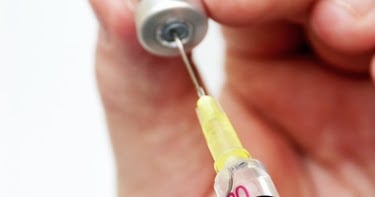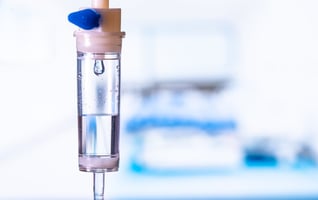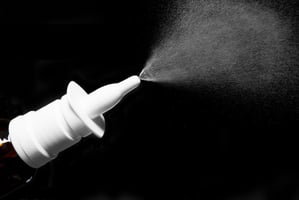An injection of the drug ketamine can produce a rapid antidepressant effect in subjects with...
Computer Program That Boosts Self-Esteem May Prolong Effects of Single Ketamine Infusion

Completing a brief computer program that encourages positive thoughts about oneself appears to maintain the antidepressant effects of ketamine for at least 30 days in people with treatment-resistant depression, according to a report published today in the American Journal of Psychiatry.
While previous studies have shown that intravenous ketamine can rapidly reduce symptoms of depression within a couple of hours, these effects tend to wear off within weeks. The findings suggest that a low-cost, automated behavioral intervention might help to extend the effects of a single infusion of ketamine for patients who do not respond to other treatments.
“Training the brain to link perceptions of yourself with positive ideas during this ketamine-primed plasticity window exceeded my expectations,” said lead author Rebecca Price, Ph.D., an associate professor of psychiatry at the University of Pittsburgh School of Medicine, in a press release. “I was surprised and amazed to get such clear findings from an intervention that was so minimal.”
For the study, 154 adults (aged 18 to 60) with treatment-resistant depression were assigned to one of three groups: one received a ketamine infusion (0.5 mg/kg over 40 minutes) plus automated self-association training (ASAT); the second received a saline infusion plus ASAT; and the third received a ketamine infusion plus sham ASAT.
ASAT consisted of eight 15- to 20-minute sessions delivered twice daily for four consecutive days that were initiated one day after infusion. For the ASAT sessions, participants viewed words associated with positive feelings (such as “lovable” and “worthy”) and images of themselves and other people. Participants performed simple computer tasks, such as indicating whether targets were real words or random letter strings, to enhance engagement and reinforce the positive associations. Sham ASAT consisted of the same computer tasks, but with predominantly neutral rather than positive images and words, and no images of the participant.
The primary outcome was score on the Montgomery-Åsberg Depression Rating Scale (MADRS), and the participants were followed for 30 days.
Price and colleagues found that ketamine rapidly and significantly reduced MADRS total depression scores 24 hours after infusion.
Depression scores in the ketamine plus ASAT group remained significantly and stably low over the 30-day study period compared with those in the saline plus ASAT group. In contrast, depression scores in the ketamine plus sham ASAT group increased over the 30 days, approaching the levels observed in the saline plus ASAT group.
“If the present results can be replicated, this novel, integrative treatment may provide a method to urgently bring relief and to efficiently extend this relief via safe, low-cost, portable techniques,” the researchers wrote.
For related information, see the American Journal of Psychiatry article “Single, Repeated, and Maintenance Ketamine Infusions for Treatment-Resistant Depression: A Randomized Controlled Trial.”
(Image: iStock/PeopleImages)
Don't miss out! To learn about newly posted articles in Psychiatric News, please sign up here.






